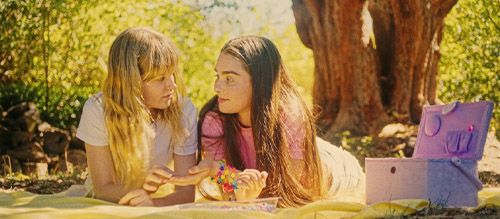My First Summer (2021) Review- BFI Flare
My First Summer (2021)
Director: Katie Found
Writer: Katie Found
Starring: Markella Kavenagh, Maiah Stewardson, Katherine Tonkin, Edwina Wren, Harvey Zielinski, Steve Mouzakis, Arthur Angel
My First Summer captures first love; the kind of love that feels as though you are the only two people in the world. Unfortunately, like all cliché LGBTQ+ cinema, this love begins with and is surrounded by trauma and death.
The film follows Claudia (Markella Kavenagh), a young woman left alone in the world after failing to commit suicide alongside her mother (Edwina Wren) at a local reservoir. Claudia meets Grace (Maiah Stewardson), and they form an instant bond sealed with a ‘purple promise’ – their own special version of a pinky promise. It becomes apparent that Claudia has lived an extremely sheltered life with her mother, with little to no contact with the outside world. As such, Grace takes it upon herself to help Claudia through this tragedy.
The most striking aspect of My First Summer is how beautiful it is to look at – Matthew Chuang’s cinematography is stunning. Reminiscent of other dreamy teenage dramas such as The Virgin Suicides, My First Summer has something of a timeless quality. To this point, there are few mentions of popular culture and the girls don’t use mobile phones, making it difficult to date the film. The costuming has also clearly been chosen to fit this brief; here clothing is used more for characterisation than to mark an era. It seems like everything about this film is controlled and well considered.
My First Summer goes to great lengths to project youthfulness onto its central characters. Claudia has an air of innocence brought on by her untraditional upbringing; Grace is adorned with plastic jewellery and a naïveté about life – she has the ever-youthful notion that her homemade jewellery is her ‘ticket out of here’. Grace takes the opportunity to show Claudia all the joy that can be had in the real world through strawberry milk, Lip Smackers and Lucky Charms. Grace brings colour and light to Claudia’s life, literally – she dyes her bed sheets purple using berries and plums. Claudia is characterised through her white and cream clothing and often shot around nature, whereas Grace’s personality is shown through bright colours and man-made materials.
Despite being a useful tool for characterisation, the clear attempt to present the characters as youthful does make the sexual elements of the film feel uncomfortable. In a world where women, especially young women, are over-sexualised by society, there is an awkwardness to watching a film so clearly about young love further this sexualisation. Of course, that’s not to say that young people do not have sex, but the script makes it very clear that both girls are 16, with Claudia in particular being presented as young and vulnerable in comparison to her sexual partner, creating an off-putting inequality between the pair.
Although the film is not presented through the male gaze – something that is clearly important to female Director, Writer and Producer Katie Found – there is an adult perspective placed on the film. The actions of the characters are youthful, they play adults by drinking coffee, but then need marshmallows to sweeten its bitter taste. But the philosophy of the girls, particularly that of Grace, is adult; she wants to help Claudia move on from her mother’s death and she tells her, much like a teacher would, to go out and find her true self. There is a disconnect between how the film attempts to present the characters created and how the girls act.
Despite some issues, My First Summer has real potential to become a cult classic. By presenting first love between two young girls without a male gaze, Found has really set her film apart from others of the genre. Refreshingly, this is not a coming out story – all too often teenage LGBTQ+ characters are presented with a certain level of angst about their identities, whereas My First Summer seems to ignore the fact its characters are the same sex and presents them simply as being in love. This refreshing take on LGBTQ+ first love allows the film, and perhaps many of us, to brush off any uncomfortable feelings about the inequality between the two girls.
15/24


